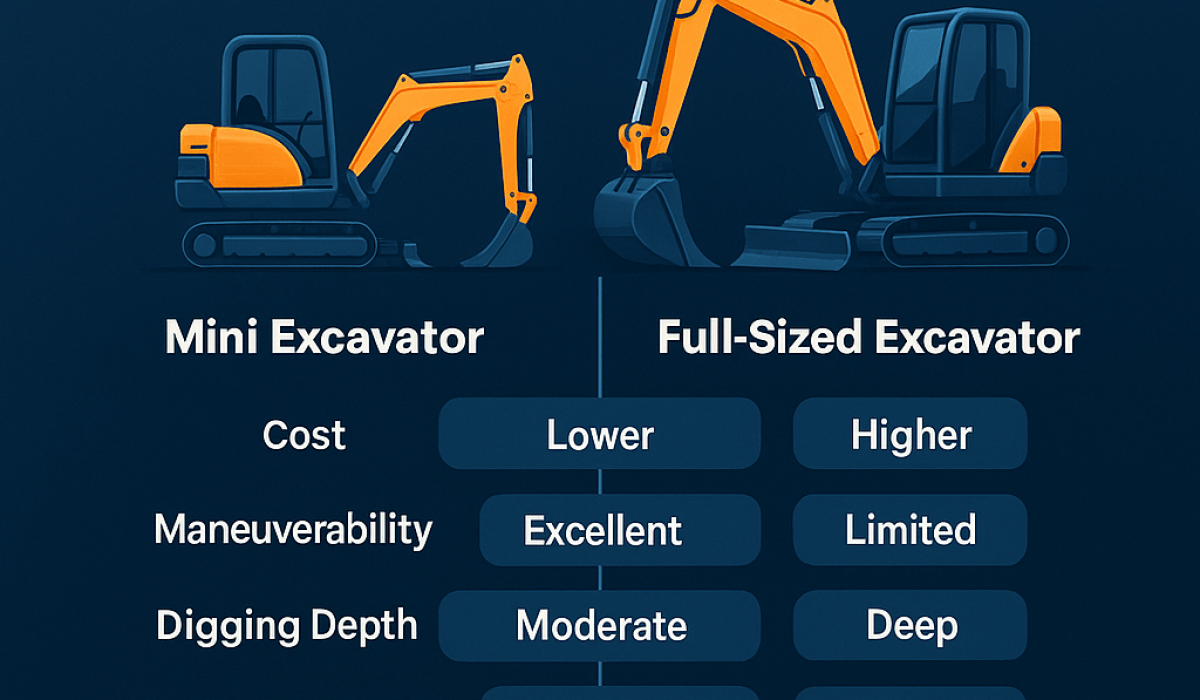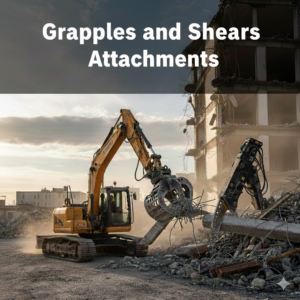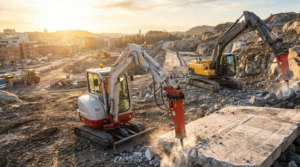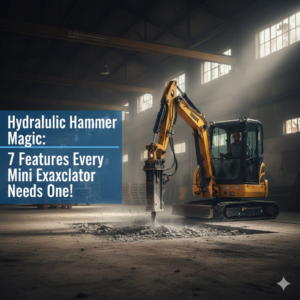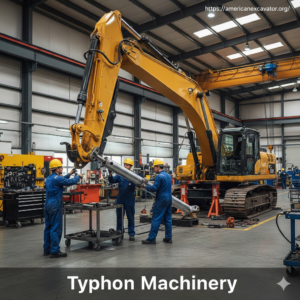Introduction
In the construction sector, landscaping, and for utility jobs, what tools you have makes the difference between a sound investment and the deal becoming a waste of money. With the increasing call for small and versatile equipment, there has been one machine that has been the cause of talks among contractors and DIY enthusiasts—the mini excavator. If, for example, you need to dig the ground, smash some small structures, or reach rocky spaces with restricted access, these small-sized moving machines with high power have definitely become a must.
Perhaps, the most critical issue is whether a mini excavator is truly a dependable investment?
Until now, like every other major purchase, the decision has been and still is influenced by the exact requirements, the nature of the work you do, and how much you will use the machinery. The aim of this article is to discuss the advantages, disadvantages, different cost aspects, and real-life situations in detail of mini excavators. At the end of the day, you will have no doubts whether you should buy this low-profile machine, or alternatively, rent or subcontract the job will be a sounder choice budget-wise.
Therefore, put on your metaphorical hard hat—step into the soil, and let’s rake the dirt and find the golden nugget out of it.
What is a Mini Excavator?
A mini excavator, also known as a compact excavator, is a smaller version of a standard excavator. Typically weighing between 1 and 10 tons, these machines are designed for lighter, more precise work in areas where space is limited. But don’t let the word “mini” fool you—they pack serious performance.
Typical Specifications Include:
-
Operating weights between 1 to 10 tons
-
Digging depths from 5 to 15 feet
-
Attachments like augers, hammers, buckets, and grapples
-
Rubber tracks for reduced ground impact
They’re especially useful in urban environments, residential landscaping, underground utility work, and indoor demolition tasks where space constraints prevent the use of larger machinery.
Common Applications:
-
Digging trenches for plumbing or electrical lines
-
Grading and leveling soil
-
Small-scale demolition
-
Material handling
-
Landscaping tasks like tree planting or stump removal
Unlike their larger cousins, mini excavators are built to perform delicate, controlled movements with precision. They also offer a 360-degree swing, allowing them to work in tight spaces without constantly repositioning the machine.
And here’s the cool part—they’re designed with ease of use in mind. That means even less-experienced operators can usually pick up the controls quickly, which is a big plus for small business owners or part-time users.
Cost Analysis of Mini Excavators
Let’s talk numbers, because at the end of the day, that’s where the rubber meets the road. Buying a mini excavator is a serious financial decision, and understanding the full spectrum of costs is essential before making the plunge.
Purchase Price
Brand-new mini excavators typically range from $25,000 to $90,000 depending on the make, model, and features. Top brands like Bobcat, Kubota, Caterpillar, and John Deere may demand a higher price but also offer better reliability and resale value.
If you’re looking for something more budget-friendly, used machines can be found for $15,000 to $45,000. Just make sure to verify hours, maintenance records, and overall condition.
Rent vs. Buy
If you’re not using the machine regularly, renting might be a smarter financial move. Rental rates range from $200 to $500 per day, or $1,200 to $3,000 per month.
Here’s a quick cost breakdown:
| Ownership Option | Initial Cost | Monthly Cost | Best For |
|---|---|---|---|
| Buy (New) | $25,000–$90,000 | $300–$500 (maintenance) | Frequent, long-term use |
| Buy (Used) | $15,000–$45,000 | $300–$500 | Budget-conscious buyers |
| Rent | $200–$500/day | N/A | Short-term, occasional use |
Operating & Maintenance Costs
Maintenance is fairly affordable. You’re looking at regular oil changes, filter replacements, and occasional hydraulic system maintenance. These can cost around $1,000–$2,000 annually.
Don’t forget fuel. Most mini excavators are diesel-powered, and depending on usage, you’ll burn through 1–2 gallons per hour.
All told, if you’re using the machine consistently, ownership often beats rental in terms of ROI after just a few months.
Benefits of Owning a Mini Excavator
Still on the fence? Let’s dig into the perks. Owning a mini excavator gives you much more than just a powerful tool—it provides flexibility, autonomy, and long-term cost efficiency.
1. Versatility
Mini excavators are the Swiss army knives of compact equipment. Thanks to a wide range of available attachments, you can switch from digging to grading, trenching, demolition, or even lifting with ease.
2. Fuel Efficiency
These machines are designed to consume less fuel compared to their larger counterparts. That translates to lower operational costs, especially on long projects.
3. Maneuverability
Because of their compact design, they can navigate through narrow gates, driveways, and tight alleyways. Perfect for urban or residential projects where space is at a premium.
4. Ease of Transportation
You don’t need a massive trailer or commercial truck to haul a mini excavator. Many can be towed with a regular pickup truck, saving you money and logistical headaches.
5. Lower Impact on Terrain
Mini excavators are built to tread lightly—literally. Their rubber tracks reduce ground damage, which is a lifesaver on delicate lawns or finished surfaces.
6. Operator-Friendly
Controls are intuitive, and most models come with ergonomic cabins, safety features, and even climate control. This reduces fatigue and boosts productivity on long jobs.
In short, if your business involves regular earthmoving or site prep in tight spaces, owning a mini excavator can pay off big-time.
Mini Excavator vs. Full-Sized Excavator
Alright, let’s compare apples to apples—or in this case, minis to maxis. When choosing between a mini and a standard excavator, it all comes down to the scope of work.
Size and Accessibility
Mini excavators can easily maneuver in places where full-sized models simply can’t go. Need to work in someone’s backyard, next to a building, or inside a warehouse? The mini wins hands down.
Digging Power
Of course, full-sized excavators have more horsepower and can dig deeper and faster. They’re ideal for large-scale infrastructure work, mining, or commercial construction.
Transportation
Full-sized excavators require special permits and heavy-duty transport. Minis? Just hitch ’em up to your pickup and go.
Cost Efficiency
If you’re doing residential jobs, landscaping, or utility trenching, a full-sized excavator might be overkill. You’d be burning more fuel, paying more in maintenance, and probably not using half its capabilities.
Use Case Summary:
| Feature | Mini Excavator | Full-Sized Excavator |
|---|---|---|
| Cost | Lower | Higher |
| Fuel Consumption | Low | High |
| Maneuverability | Excellent | Limited |
| Digging Depth | Moderate | Deep |
| Transport Ease | Easy | Difficult |
| Best For | Residential, Landscaping, Utility | Infrastructure, Heavy Construction |
So, if your projects don’t demand massive digging power, the mini excavator is likely the smarter, more profitable investment.

